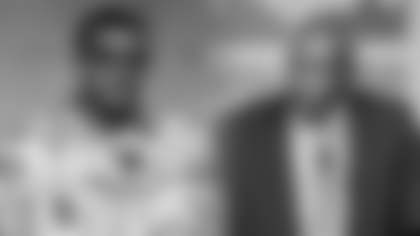In the current NFL, there is wall-to-wall coverage of all topics, including the annual draft.
But it was not always so, nor were the Denver Broncos a team with the glittering championship reputation of today.
Back in the day, the Broncos were a franchise that had never experienced a winning season. As hard as that is to imagine, such was the situation from the inaugural season of 1960 through 1972.
Thirteen years of futility, no matter whom the Broncos drafted.
But in 1972, Denver hired Stanford coach John Ralston to be the general manager head coach, and the player selection process has never been the same. That's exactly what Ralston's greatest acumen leading the Broncos turned out to be, and Denver's first winning seasons followed in 1973, 1974, and 1976, before he and the Broncos parted ways.
It has long been stated that while Ring of Fame coach Red Miller was the right man to lead Denver to its first Super Bowl, most of the team that he inherited was put together by Ralston, largely due to his drafts.
The five first-round draft choices made by Ralston included tight end Riley Odoms in 1972, running back Otis Armstrong in 1973 (Armstrong is a member of the Colorado Sports Hall of Fame), as well as perennial Pro Bowlers linebacker Randy Gradishar in 1974 and cornerback Louis Wright in 1975, along with guard Tom Glassic in 1976.
When the Broncos went to Super Bowl XII, all five of those first-round picks were starting for the team, a first for any Super Bowl team to have five years of first-round picks starting six years after the first of them was drafted.
Of course, Gradishar and Wright need no introduction to Bronco fans as Ring of Famers.
Each is a legitimate Seniors Committee candidate for the Pro Football Hall of Fame, and Gradishar leads all players being considered by the veterans committee with seven Pro Bowl appearances.
This was back in the day before the NFL had a national combine in which all teams evaluated all top players.
Teams did their own research and had their own reports, and in 1974, both Baltimore and Detroit actually failed Gradishar on his physical, due to an old injury from his days at Ohio State.
But Ralston was undaunted, and he was proven to be a draft prophet as Gradishar never missed a single game in his 10-year career with the Broncos.
He is credited by coaching stats with a record 2,049 total tackles, including assists. Remember, the Broncos were the first modern team to use the 3-4 defense exclusively. Everything was funneled to the middle and Gradishar made the tackles like he was playing a Pac-Man game.
Gradishar recorded 20 interceptions and 13 fumble recoveries during his career and has been called by "The Football Encyclopedia" as one of the 250 greatest players ever to play pro football.
But Ralston's drafting did not stop with round one.
In all, that 1977 Super Bowl team featured an Orange Crush defense that had seven players who made the Pro Bowl at one time or another, and all of them except safety Billy Thompson were Ralston draftees.
Fifteen players drafted by Ralston played in Super Bowl XII, and 16 of the starters for Denver had been acquired by "J.R.," as he was commonly known.
Some would argue (myself included in this group) that considering the state of the franchise prior to Ralston's tenure, the best draft in Denver history was Ralston's in 1973.
In addition to an All-Pro in Armstrong, Ralston tabbed defensive end Barney Chavous in round two, 10-year starter Paul Howard in the third, and an emotional leader and three-time Pro Bowler Tom Jackson in the fourth round.
Other draftees who made the team that year included defensive end John Grant (round seven, and he was one of the Super Bowl Broncos), linebacker Jim O'Malley (round 12), defensive end Ed Smith (round 13), quarterback John Hufnagel (round 14), cornerback Calvin Jones (round 15) and running back Oliver Ross (round 16).
That is a stunning total of 10 draftees from 1973 who made the roster of a Denver team that would break ground and make history with its first winning season that very year.
Some of them played more than a decade in Denver (Jackson, Chavous and Howard), and one, Hufnagel, played briefly here before going on to a four-decade career of championships in the Canadian Football League as player, coach and administrator.
That is a tough record to top, particularly for a franchise that entered the draft with 13 consecutive non-winning seasons.
After leaving Denver, Ralston eventually returned to a successful career coaching in college, but he made his mark in the Mile High City with drafts that led to our first three winning seasons and helped set the table for the Broncos' success in postseason play.














